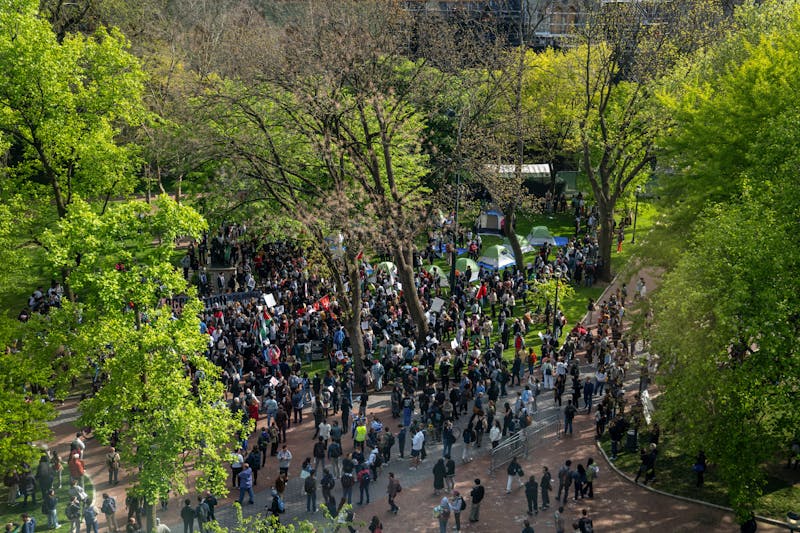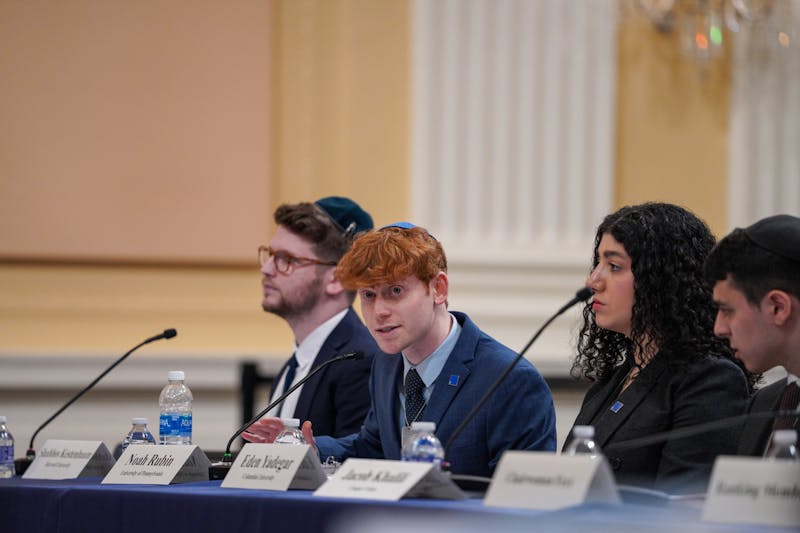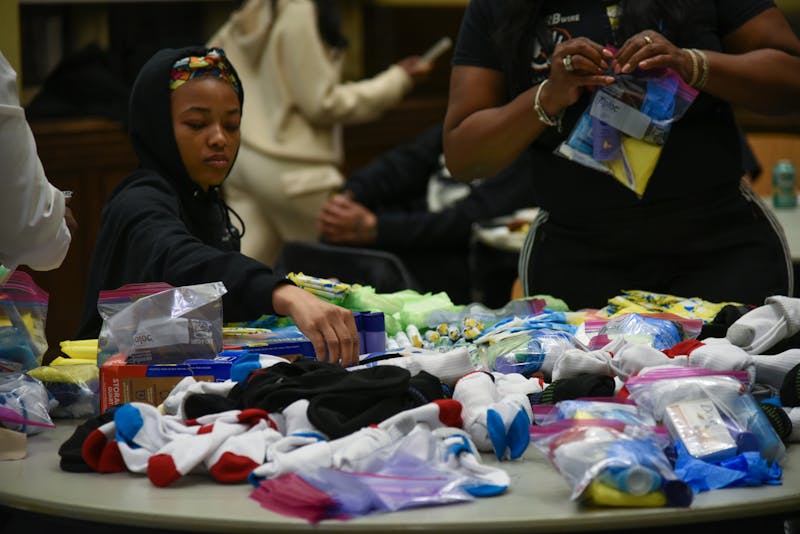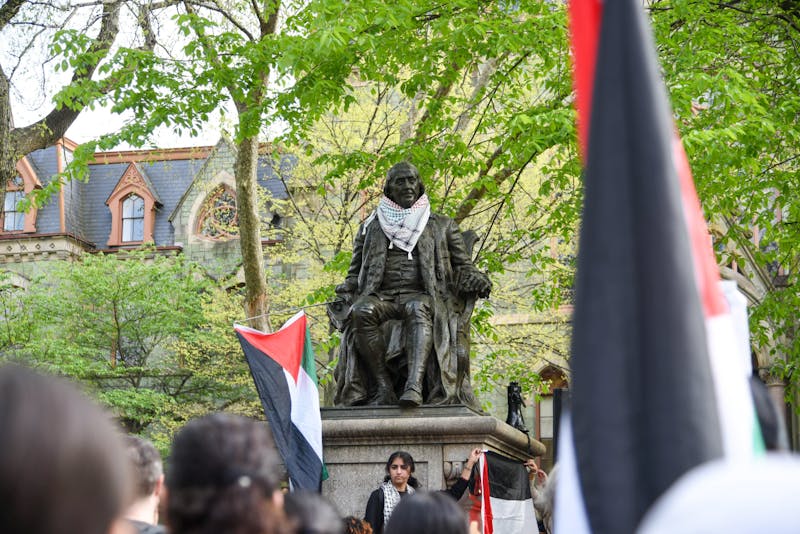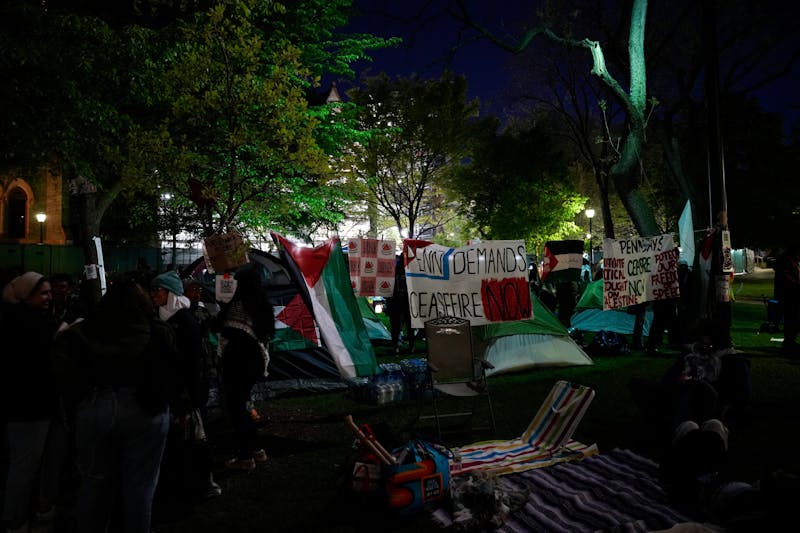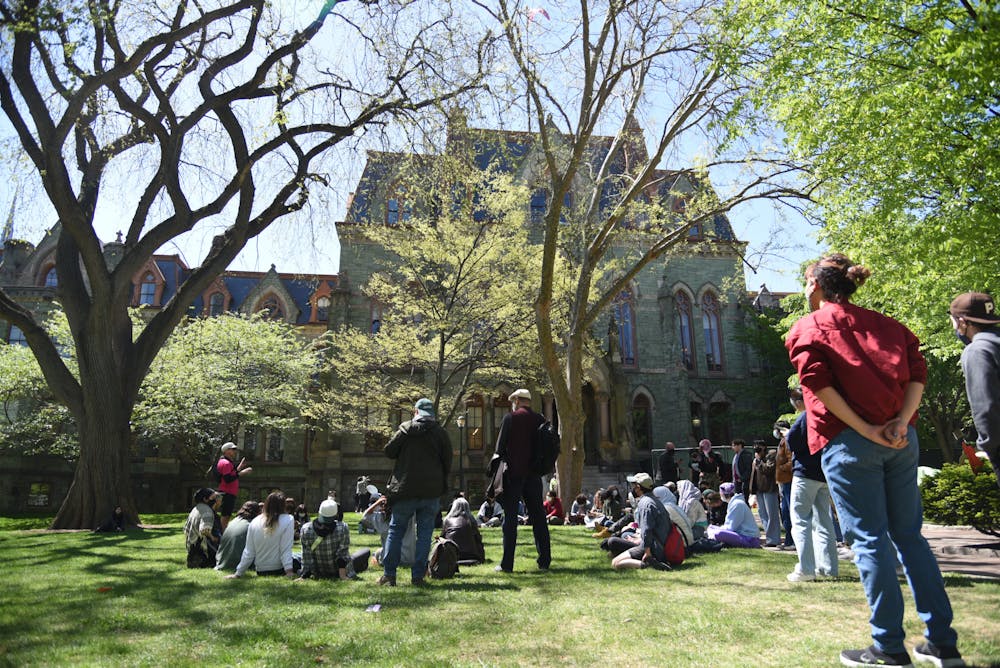
From poetry readings to teach-ins, protesters have engaged in a wide range of programming throughout the second day of the Gaza Solidarity Encampment on College Green as they make their case for their demands for Penn to divest from its ties to Israel's war in Gaza.
Events offered included speakers, poetry readings, and de-escalation training. Protesters also continued to pray, chant, and make banners throughout the day.
At around 12 p.m., approximately 30 protesters participated in a training from the National Lawyers Guild on College Green. A member of the National Lawyers Guild told the group that the organization is there to provide legal support, emphasizing that guild members are all volunteers.
“Surprises happen, and we’ll always have your back no matter what,” he said. “But if we could avoid surprises, that makes everybody’s job easier.”
He said that the guild had met earlier with “Penn Police brass,” who said that they would not arrest anyone in the encampment unless there was violence, escalation, or vandalism. These descriptions of behavior were “very loosely defined” by Penn Police, he said.
A second Lawyers Guild volunteer then spoke to the protesters about how to avoid escalation and remain calm in the face of antagonistic behavior “intended to stir your emotions,” including social media activity or actions by “Zionist” counterprotesters. They also participated in role-playing exercises to learn how to interact safely with police officers and counterprotesters.
“We have to remember what they’re trying to get is that response that makes you look abusive,” she said.
Around 3:15 p.m., Penn professor and Penn Faculty for Justice in Palestine organizer Dagmawi Woubshet spoke to the crowd.
“What we have seen in the last six and a half months here at the University of Pennsylvania is a concerted effort by donors, by politicians, by administrators, not only to suppress the speech of Palestinian members of our community and their allies, but also an effort to distort our language and our actions,” he said.
He also spoke of a “larger conservative, right-wing, anti-intellectual agenda to deliberately misconstrue the terms of our critique.”
After his speech, encampment organizers informed participants that they should not engage with any counterprotesters.
Two Black liberation activists were the next to speak to the encampment. They gave their speeches around 3:55 p.m.
Fred Hampton Jr. of the Black Panther Party Cubs spoke first, engaging in a “free them all” call-and-response chant with the audience. Hampton spoke about the legacy of his father, Black Panther activist Fred Hampton, and the work of the Black Panther Party, as well as themes of justice and solidarity across movements.
Hampton discussed the history of the Black Panther Party and how the Counter Intelligence Program was used to "discredit and divide any Black Nationalist group." Hampton went on to say that "we need [to] decolonize communities."
Pam Africa, a former member of the MOVE movement, was the second speaker. She spoke to the encampment at around 4 p.m. on the importance of standing together while being threatened with violence.
“People, you are responsible for getting the truth out no matter how hard they come,” she said.
Around 4:30 p.m., associate professor of Arabic literature Huda Fakhreddine gave a speech to the crowd, criticizing Interim Penn President Larry Jameson.
“It’s a little too late, Larry,” she said. “Why did it take you so long to remember that we’re part of this community?”
Fakhreddine added that people are “traumatized here” and that “just like [his] predecessor,” Jameson has been “ignoring us and erasing us.”
“We are the University of Pennsylvania community,” she said. “We are diverse. We are Muslim, Christian, Jewish. We are trans, bi, queer, we are cynical, we are neutral. We are committed, we are invested. But most of all, we are angry.”
Fakhreddine is one of the plaintiffs in an ongoing lawsuit against Penn seeking to prevent the handover of requested documents to Congress.
At around 5 p.m., several local politicians spoke at the encampment in solidarity with the protesters.
Pennsylvania Rep. Rick Krajewski — who represents Penn — spoke to the encampment at College Green during the afternoon program, emphasizing his support for the demonstration. City Councilmember Jamie Gauthier, whose district also includes Penn, sent a staffer to show her solidarity.
“It really warms my heart to see the depths of care that this community has been showing to communities across the globe,” the staff member said. “And the way that you care and stand up for Palestine makes me proud to be in the same lineage.”
Krajewski noted that Philadelphia At-Large City Council Members Nicolas O’Rourke and Kendra Brooks — while not present at the encampment — were there in solidarity with the protesters.
“They’re gonna say that you’re doing something too radical, you’re doing something fringe. But there are people who know that is not true, that this is actually about peace,” Krajewski said.
At 7 p.m., members of the encampment gathered to listen to a conversation between two Israeli historians — Omer Bartov, the Samuel Pisar Professor of Holocaust and Genocide Studies at Brown University, and Raz Segal, associate professor of Holocaust & genocide studies and endowed professor in the study of modern genocide at Stockton University — on “Defining Antisemitism.”
The professors spoke on a range of topics surrounding the war in Gaza, including the history of the Israel-Hamas war and the importance of organizing, gaining, and “changing” power. They then fielded a series of questions from the audience about their beliefs.
Senior reporters Ella Sohn, Elea Castiglione, Emily Scolnick, and Neema Baddam, and staff reporter Jasmine Ni contributed reporting to this article.
The Daily Pennsylvanian is an independent, student-run newspaper. Please consider making a donation to support the coverage that shapes the University. Your generosity ensures a future of strong journalism at Penn.
Donate







